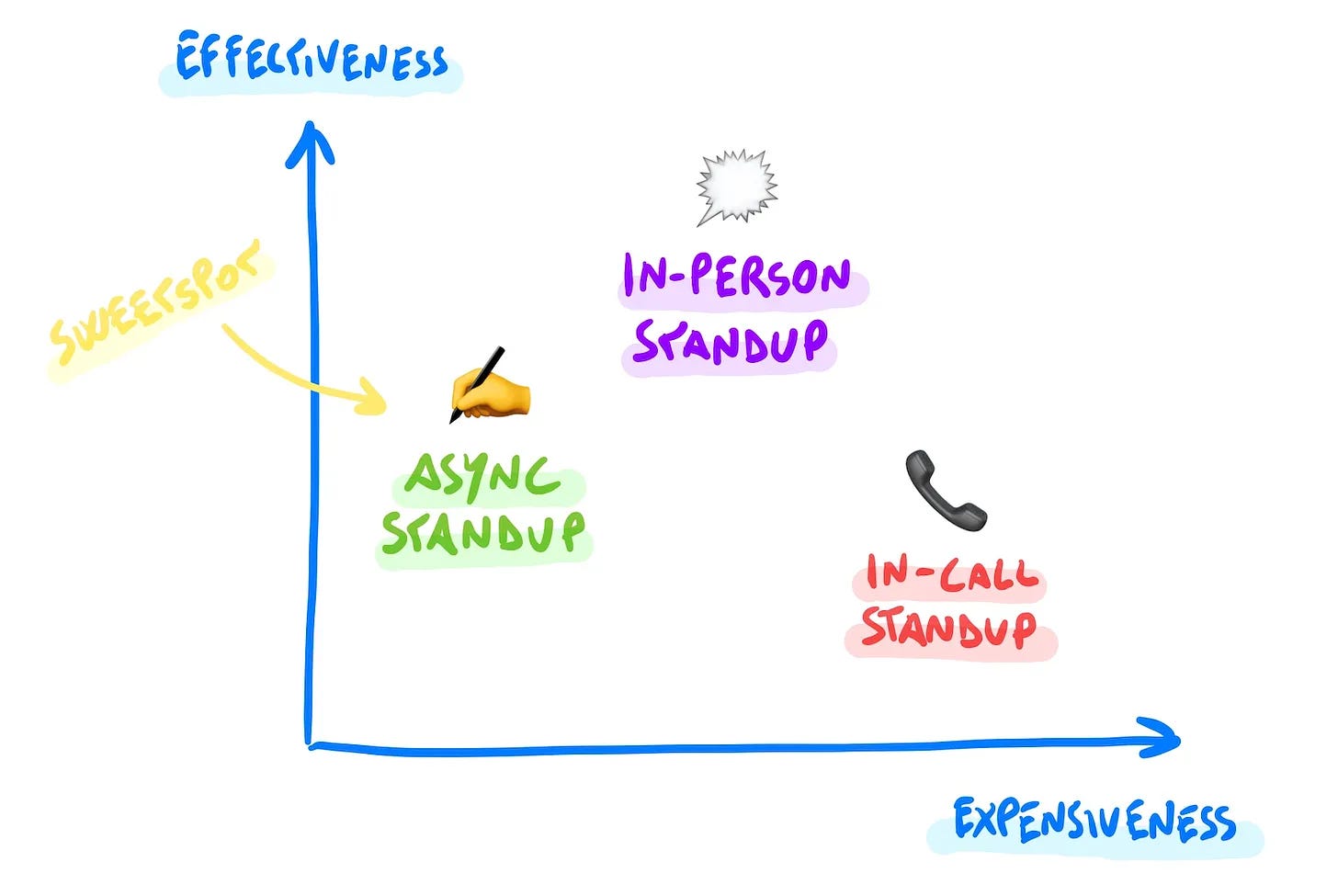1) 🔄 Work loops for small teams
One of the problems with management advice is that it depends on the size of your team.
So, whenever I write about some process or ceremony in a generic way (I am often guilty of that), I get questions along the lines of: “but does this apply also to my startup, that is <10 people?”
When your team is small, communication is easy and there is no need for fancy process. My best advice is to just focus on creating a basic work loop. This is what it may look like:
🔨 Weekly dev cycle — you have a lightweight planning at the beginning, and a demo for the whole team at the end. You still want to ship things ASAP, likely multiple times a day. The weekly ceremonies just help with pacing and with keeping everyone on the same page.
🎯 Monthly goals — a longer timeframe cycle is useful to anchor things you don’t want to do every week. You may do some product strategy, set targets for your KPIs, and have retrospectives.
☀️ Standups — I am a big fan of async standups. They take 5 mins of your time, force you to reflect on your day, and solve 80% of the blockers and coordination problems.
This is not one-size-fits-all. You should experiment and stick with what works for you. We used to run Scrum — then, over time, we changed the parts we didn’t like and tweaked them until we were happy with the result.
I wrote more about these choices at different stages, in this past article about the life of a CTO 👇
2) 🔨 The Six Areas of Burnout
Burnout is often associated with excessive workload, but this is only one out of many possible causes.
Christina Maslach has studied burnout for her whole career, and has identified the six main areas that contribute to your stress:
1) Control 🔍
Control and autonomy have long been identified as key for motivation. Conversely, their lack takes a toll on your wellbeing.
Lack of control takes many shapes and forms. You might feel any of these:
Your boss micromanages your work and takes away ownership from you.
You don’t have access to skills / resources to do a good job.
You feel you are constantly in reactive mode, rather than proactive.
2) Reward 🏆
Your effort should be matched by the reward you receive. There are two kinds:
⬅️ Intrinsic — professional growth, sense of purpose, impact.
➡️ Extrinsic — financial and social rewards.
In my experience, the value of intrinsic rewards largely trumps that of extrinsic ones, even if we may not always feel that way.
3) Community 🍻
Lack of social support and trusted relationships at work strongly predict exhaustion. Remote work has exacerbated this issue for many.
More on building remote relationships in this previous article.
4) Fairness 🤝
Fairness is about receiving equitable treatment. In part, it is the result of the other elements working well. An adequate workload, sense of control, being rewarded properly, and support from (e.g.) your manager.
But we also judge this in comparison to peers, which can cause stress even when personal conditions are good.
5) Values 🏅
We work best when our personal values align with those of our job/company. Value mismatches can cause considerable stress and are often difficult to resolve.
6) Workload 🏋️♀️
Finally, workload! Your workload should match your capacity, allowing you to complete tasks, rest and recover, and grow professionally.
When you sacrifice some of these elements because of overload, you develop stress.
I wrote more about identifying and defusing stress in this previous article 👇
3) 🧮 Performance calibration
Calibration stands for all-things performance management.
This topic can get more or less nuanced based on the growth stage of your company, and include things like performance reviews, career frameworks, compensation, and succession plans for critical roles.
About engineering performance, I like Gusto’s simple approach, which takes care of four axes:
🗃️ Project — the direct impact you or your team (if a manager) have on deliverables. It's best described in terms of customer behavior changes (e.g., increased product usage, higher NPS) or learnings that influence product direction.
🔨 Engineering — improvements in systems that boost engineer effectiveness. It includes reducing test time, error rates, or new hire ramp time. Its importance grows with seniority due to the broader expected impact on the overall system.
🪴 People — enhancing team efficiency and health through things like hiring, mentoring, providing feedback, and code reviews. Metrics for People impact include team engagement, effective hiring, team health, and qualitative feedback from team members and peers.
🏢 Organization — improving the overall health of the organization. Examples include enhancing the hiring process through new interview questions or rubrics, driving diversity programs, and representing the company at external events.
I also wrote more about calibration in two previous pieces:
🏅 Performance Reviews — a first-principles approach to performance management + a practical workflow + wild ideas from successful companies.
🪜 Career Frameworks — what they are useful for, how to use them, and the various styles and examples.
And that’s it for today! If you are finding this newsletter valuable, consider doing any of these:
1) 🔒 Subscribe to the full version — if you aren’t already, consider becoming a paid subscriber. 1500+ engineers and managers have joined already! Learn more about the benefits of the paid plan here.
2) 🍻 Read with your friends — Refactoring lives thanks to word of mouth. Share the article with your with someone who would like it, and get a free membership through the new referral program.
I wish you a great week! ☀️
Luca




